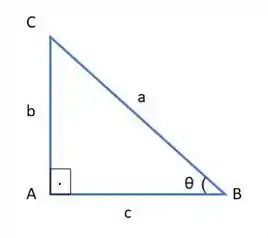Calcule
Passo 1
A função dentro da integral é:
Não parece muito familiar?
Na verdade a resolução pra esse tipo de função é chamada substituição trigonométrica e funciona assim:
A gente pega um triângulo retângulo com ângulo como esse:

Agora imagine que um dos catetos vale 2, e o outro cateto vale , concorda comigo que a hipotenusa vai valer ?
Então que substituição poderíamos fazer?
Bem, se dissermos que então
Assim podemos substituir a integral dessa forma:
Ótimo! Agora podemos calcular essa integral de maneira mais fácil
Passo 2
Agora só precisamos achar o valor de
Pra isso vamos fazer assim:
Que exatamente:
Podemos substituir pela variável
Assim:
Substituindo, teremos:
Passo 3
Agora precisamos voltar pra variável , lembrando:
Assim:
Lembrando que
Assim, podemos reescrever a função como:
Como se trata de um número, podemos considera-lo como parte da constante:
E substituir: